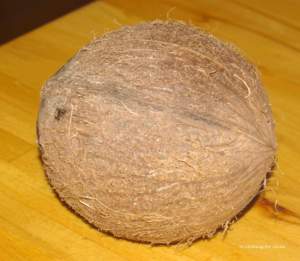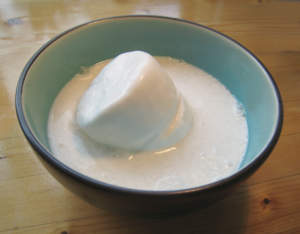Coconuts are known for their great versatility, not only in the culinary world but also for their varied uses in cosmetics. While coconut is considered a mainstay in the diet of nearly one-third of the planet, it is an exotic ingredient in the western world! They are classified as a fruit but frequently confused for being a nut, and are a one-seeded drupe (same family as peaches, plums and cherries).

The fruit is made up of three layers: the outside layer is known as the exocarp, and the fibrous husk or mesocarp is the inside of it. The thin woody layer surrounding the actual coconut is the endocarp.
The term coconut is derived from the 16th century Portuguese and Spanish word coco meaning head or skull, from the three indentations on the coconut shell that resemble facial features. The name supposedly came from Portuguese explorers, the sailors of Vasco da Gama in India, who first brought them in Europe.
It has generally been accepted that the coconut originated in the Indian-Indonesian region and distributed itself around the world by riding ocean currents. Most of the world production of coconuts is in tropical Asia, with Indonesia leading followed closely by Philippines and India. Together, the three countries account for 73% of the world’s production.

Coconut milk is a common ingredient in many tropical cuisines. Coconut is also a very frequently used ingredient in South Indian cuisine. The most common way is the addition of freshly grated coconut to vegetable and spices at the end of the cooking. Also, the coconut chutney which accompanies most south Indian dishes like dosa and uttapams is a prime example of the extensive use and importance of coconut in the cuisine of the Southern states.
Coconuts are used extensively in Hindu religious ceremonies. Coconuts are usually offered to the Gods, and a coconut is smashed on the ground as part of a new beginning to a business or a construction or inauguration of new projects or also to launch a newly completed project. This act signifies a sacrifice of ego, the idea that wealth stems from divinity, and that, if due credit is not given, bad karma is taken on.
You may like to read Recipes with coconuts

Comments are closed.